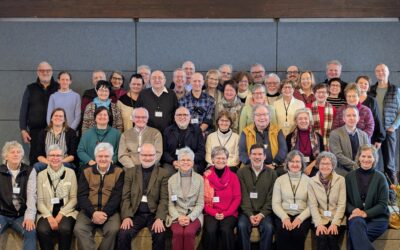 “This is a horrific and frightening moment. But we are also surprised at the international impact, by all the public support, and we feel responsible for responding appropriately.” Muriel Fleury is the director of the Focolare’s French magazine, Nouvelle Cité and this was her answer to Radio inBlu’s question about why such events could take place in France where the process of integration is older than in any other European country. She responded: “Although in the past we were successful at integrating other peoples, it seems that in recent years we have fallen a bit behind. We want multiculturalism, in the sense of welcoming other, but without taking their cultures into account, their values that are quite different from our own. Therefore, all the places that lend themselves to dialogue, true encounter, true cultural and religious sharing need to be developed. Our failure to have an authentic encounter has led to today’s tragic situation.” Paul Wirth, a member of the Focolare engaged in interreligious dialogue, remarked: “I belong to an Islamic-Christian Friendship Group (GAIC) in France. Every year we hold a week of meetings (the most recent beginning on November 12). We feel that it is very important to make everyone aware, so that people will make a distinction between authentic Muslims and those who claim to be Muslims but project hatred.” Speaking of the reaction of Muslim friends to attacks on Friday evening, he said: “There are many Muslim associations that have put out press releases condemning the attacks as barbaric, intolerable; they want to be close to the victims and their families. Just today I saw that many Muslim associations spoke of this as a horrible moment, and we Christians believe that these tragic events do not affect the relations of fraternal love that have been established amongst us [Christians and Muslims].” In her analysis, Muriel Fleury, director of Nouvelle Cité, pointed to other causes of the unease: “For economic reasons it seems that we have completely abandoned entire quarters of the city where even the police are at risk if they go into them. And our refusal to take care of these young foreigners, to not provide them some wholesome activity to keep them busy, to not be near to them, has led some of them to join radical pseudo-religious groups that have taken them away, many of them, and now we see the results.” From where do we begin, then, to mend such a complex fabric? “The problem,” says Fleury, “is that we are in France where, unfortunately, a spiritual void has been created. This French secularism has led to a denial of the spiritual dimension of a human being. Now we must take a new path, to develop the culture of encounter, of living together. Religions will be one of these paths, religions that are able to work with one another – even with the Republic. There are already signals in this direction that try to find solutions that include every voice from every religion.”
“This is a horrific and frightening moment. But we are also surprised at the international impact, by all the public support, and we feel responsible for responding appropriately.” Muriel Fleury is the director of the Focolare’s French magazine, Nouvelle Cité and this was her answer to Radio inBlu’s question about why such events could take place in France where the process of integration is older than in any other European country. She responded: “Although in the past we were successful at integrating other peoples, it seems that in recent years we have fallen a bit behind. We want multiculturalism, in the sense of welcoming other, but without taking their cultures into account, their values that are quite different from our own. Therefore, all the places that lend themselves to dialogue, true encounter, true cultural and religious sharing need to be developed. Our failure to have an authentic encounter has led to today’s tragic situation.” Paul Wirth, a member of the Focolare engaged in interreligious dialogue, remarked: “I belong to an Islamic-Christian Friendship Group (GAIC) in France. Every year we hold a week of meetings (the most recent beginning on November 12). We feel that it is very important to make everyone aware, so that people will make a distinction between authentic Muslims and those who claim to be Muslims but project hatred.” Speaking of the reaction of Muslim friends to attacks on Friday evening, he said: “There are many Muslim associations that have put out press releases condemning the attacks as barbaric, intolerable; they want to be close to the victims and their families. Just today I saw that many Muslim associations spoke of this as a horrible moment, and we Christians believe that these tragic events do not affect the relations of fraternal love that have been established amongst us [Christians and Muslims].” In her analysis, Muriel Fleury, director of Nouvelle Cité, pointed to other causes of the unease: “For economic reasons it seems that we have completely abandoned entire quarters of the city where even the police are at risk if they go into them. And our refusal to take care of these young foreigners, to not provide them some wholesome activity to keep them busy, to not be near to them, has led some of them to join radical pseudo-religious groups that have taken them away, many of them, and now we see the results.” From where do we begin, then, to mend such a complex fabric? “The problem,” says Fleury, “is that we are in France where, unfortunately, a spiritual void has been created. This French secularism has led to a denial of the spiritual dimension of a human being. Now we must take a new path, to develop the culture of encounter, of living together. Religions will be one of these paths, religions that are able to work with one another – even with the Republic. There are already signals in this direction that try to find solutions that include every voice from every religion.”
Trust in God
Trust in God




0 Comments